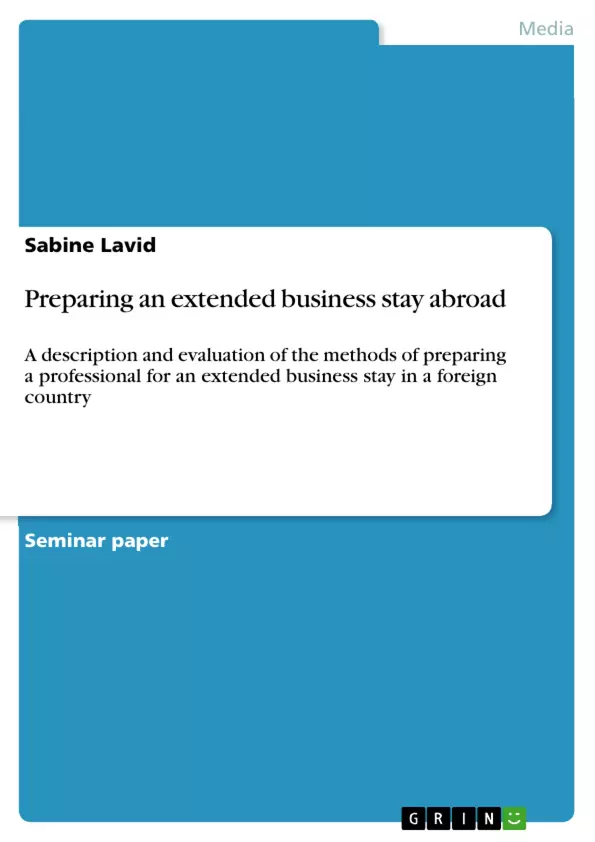As it becomes more and more vital to stay competitive, not only in the local but international market, companies tend to send professionals more frequently abroad. These professionals ought to satisfy the demand in managerial or administrative assistance in cross-company projects, safeguard a uniform company policy within lately founded subsidies or ensure a more fluid information flow in international mergers or acquisitions. Sending a professional abroad is always costly and risky for a company. Hence, the selection of a future expatriate needs to be based on distinct criteria and a sensible preparation is to be worked out on time.
The principal aim of this assignment is to work out an overview and an assessment of feasible methods of preparing a professional for an extended business stay abroad with regard to intercultural aspects. First, I give a definition of the term `extended business stay´ which leads to a general description of required preconditions. Then I briefly focus on the phases one generally passes through during such a stay. Second, I work out a detailed description of feasible preparation methods and assess whether these are sufficiently applicable during these phases. Third, in the concluding section, I review my findings.
Inhaltsverzeichnis (Table of Contents)
- Introduction
- Definition of the term `extended business stay` in a foreign country
- Aims, qualifications and personal traits of an expatriate
- Preparation methods overview
- Cultural training methods during the preparation phase
- Culture-general training
- Culture-specific training
- Guidance during the culture-shock and adjustment phase
- Guidance during the re-entry phase
- Cultural training methods during the preparation phase
- Conclusion
Zielsetzung und Themenschwerpunkte (Objectives and Key Themes)
The main objective of this assignment is to provide an overview and assessment of feasible methods for preparing professionals for extended business stays abroad, focusing on intercultural aspects. It examines the phases involved in such stays and analyzes the effectiveness of various preparation methods in addressing these phases.
- Definition and characteristics of extended business stays
- Required qualifications and personal traits of expatriates
- Importance of intercultural competence
- Methods for cultural training and guidance
- Assessment of the effectiveness of preparation methods
Zusammenfassung der Kapitel (Chapter Summaries)
The first chapter defines the term "extended business stay" and outlines the key qualifications and personal traits required for successful expatriation. It highlights the significance of intercultural competence and its role in navigating cultural differences. The second chapter examines various preparation methods, including cultural training (culture-general and culture-specific) and guidance during different phases of the expatriate experience. It discusses the effectiveness of these methods in addressing the challenges of culture shock and adjustment.
Schlüsselwörter (Keywords)
The main keywords and focus topics of this text include: extended business stay, expatriate, intercultural communication, cultural training, culture-general, culture-specific, culture shock, adjustment, re-entry, intercultural competence, social competence, communication skills, and language skills.
Frequently Asked Questions
What is considered an "extended business stay" abroad?
An extended business stay refers to a professional being sent abroad (as an expatriate) for a significant period to manage projects, implement company policies, or facilitate international mergers.
What are the key qualifications for a successful expatriate?
Beyond professional expertise, an expatriate needs strong intercultural competence, social skills, adaptability, and proficient language skills for the target country.
What is the difference between culture-general and culture-specific training?
Culture-general training focuses on broad intercultural awareness and sensitivity, while culture-specific training provides detailed knowledge about the customs, laws, and etiquette of a particular country.
How can companies help employees deal with culture shock?
Companies can provide ongoing guidance, mentoring, and support networks during the adjustment phase to help the professional navigate the emotional and practical challenges of a new environment.
Why is the re-entry phase important?
Returning home can be as challenging as going abroad. Proper guidance during the re-entry phase ensures that the skills gained abroad are utilized and the employee remains motivated within the domestic organization.
What are the risks of a poorly prepared business stay abroad?
Poor preparation can lead to project failure, high financial costs for the company, and personal or professional burnout for the employee due to cultural misunderstandings or isolation.
- Quote paper
- Sabine Lavid (Author), 2015, Preparing an extended business stay abroad, Munich, GRIN Verlag, https://www.grin.com/document/355898



